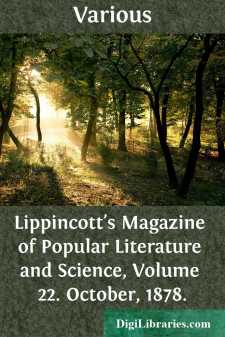Categories
- Antiques & Collectibles 13
- Architecture 36
- Art 48
- Bibles 22
- Biography & Autobiography 813
- Body, Mind & Spirit 142
- Business & Economics 28
- Children's Books 15
- Children's Fiction 12
- Computers 4
- Cooking 94
- Crafts & Hobbies 4
- Drama 346
- Education 46
- Family & Relationships 57
- Fiction 11828
- Games 19
- Gardening 17
- Health & Fitness 34
- History 1377
- House & Home 1
- Humor 147
- Juvenile Fiction 1873
- Juvenile Nonfiction 202
- Language Arts & Disciplines 88
- Law 16
- Literary Collections 686
- Literary Criticism 179
- Mathematics 13
- Medical 41
- Music 40
- Nature 179
- Non-Classifiable 1768
- Performing Arts 7
- Periodicals 1453
- Philosophy 64
- Photography 2
- Poetry 896
- Political Science 203
- Psychology 42
- Reference 154
- Religion 513
- Science 126
- Self-Help 84
- Social Science 81
- Sports & Recreation 34
- Study Aids 3
- Technology & Engineering 59
- Transportation 23
- Travel 463
- True Crime 29
Lippincott's Magazine of Popular Literature and Science, Volume 22. October, 1878.
by: Various
Description:
Excerpt
WARWICK AND COVENTRY.
OBLIQUE GABLES IN WARWICK.The history of England is written in living characters in the provincial towns of the kingdom; and it is this which gives such interest to places which have been surpassed commercially by great manufacturing centres and overshadowed socially by the attractions of London. The local nobility once held state little less than royal in houses whose beautiful architecture now masks a hotel, a livery-stable, a girls' school, a lawyer's office or a workingmen's club, and there are places where almost every cottage, every wooden balcony or overhanging oriel, suggests something romantic and antique. Even if no positive association is connected with one of these humbler specimens of English domestic architecture, you can fall back on the traditional home of love and poetry, the recollections of idyls and pastorals daily acted out by unconscious illustrators of the poets from one generation to another. Modern life engrafted on these old towns and villages seems prosaic and unattractive, though practically it is that which first strikes the eye. New fronts mask old buildings, as new manners do old virtues; and if we come to the frame and adjuncts of daily life, we must confess that nineteenth-century trivialities are intrinsically no worse than mediæval trivialities.
There are in Warwick more modern houses and smart shops than ancient gabled and half-timbered houses, but the relics of the past are still striking: witness the ancient porch of the good old "Malt-Shovel," with its bow-window, in which the Dudley retainers often caroused, and the oblique gables in one of the side streets, which Rimmer, a minute observer of English domestic architecture, thus describes: "An acute-angled street may be made to contain rectangular rooms on an upper story.... Draw an acute angle—say something a little less than a right angle—and cut it into compartments; or, if preferred, an obtuse angle, and cut this into compartments also. Now, the roadway may be so prescribed as to prevent right angles from being made on the basement, but the complementary angles are ingeniously made out by allowing the joists to be of extra length, and cutting the ends off when they come to the square. The effect is extremely picturesque, and I cannot remember seeing this peculiar piece of construction elsewhere."
At the western end of High street stands Leicester's Hospital, which was originally a hall belonging to two guilds, but, coming into possession of the Dudleys, was converted into a hospital by Elizabeth's favorite in 1571. The "master" was to belong to the Established Church, and the "brethren" were to be retainers of the earl of Leicester and his heirs, preference being given to those who had served and been disabled in the wars. The act of incorporation gives a list of neighboring towns and villages, and specifies that queen's soldiers from these, in rotation, are to have the next presentations. There is a common kitchen, with a cook and porter, and each brother receives some eighty pounds per annum, besides the privileges of the house....












